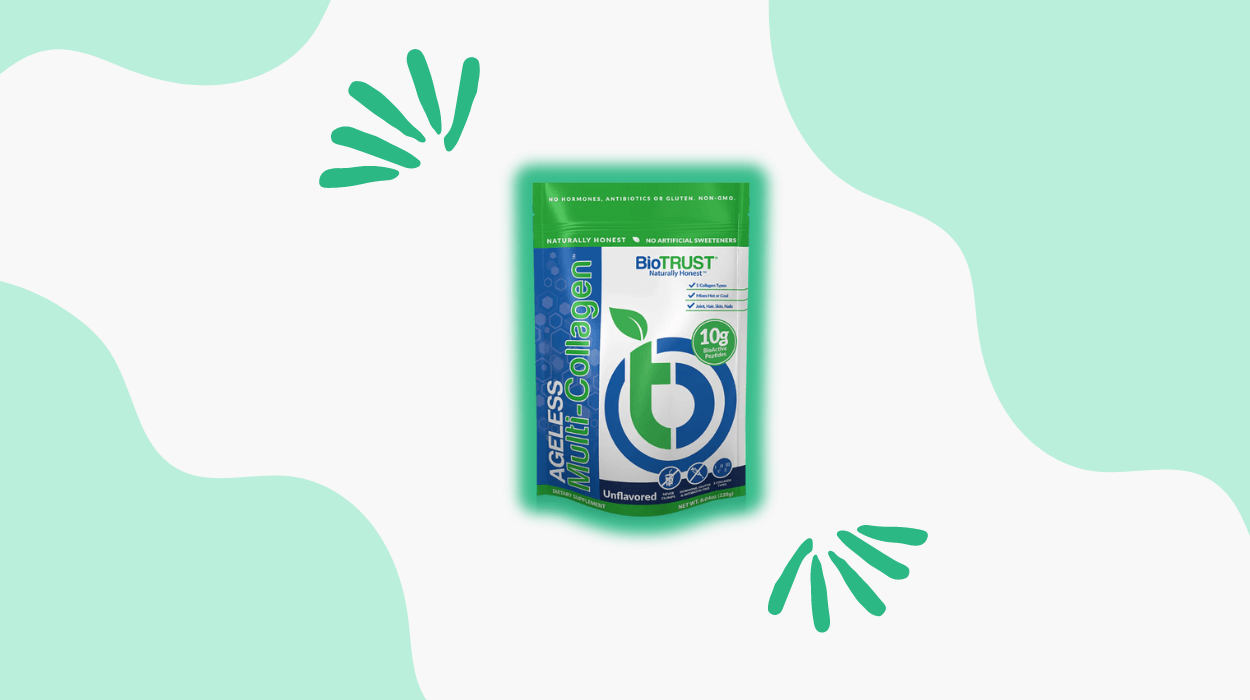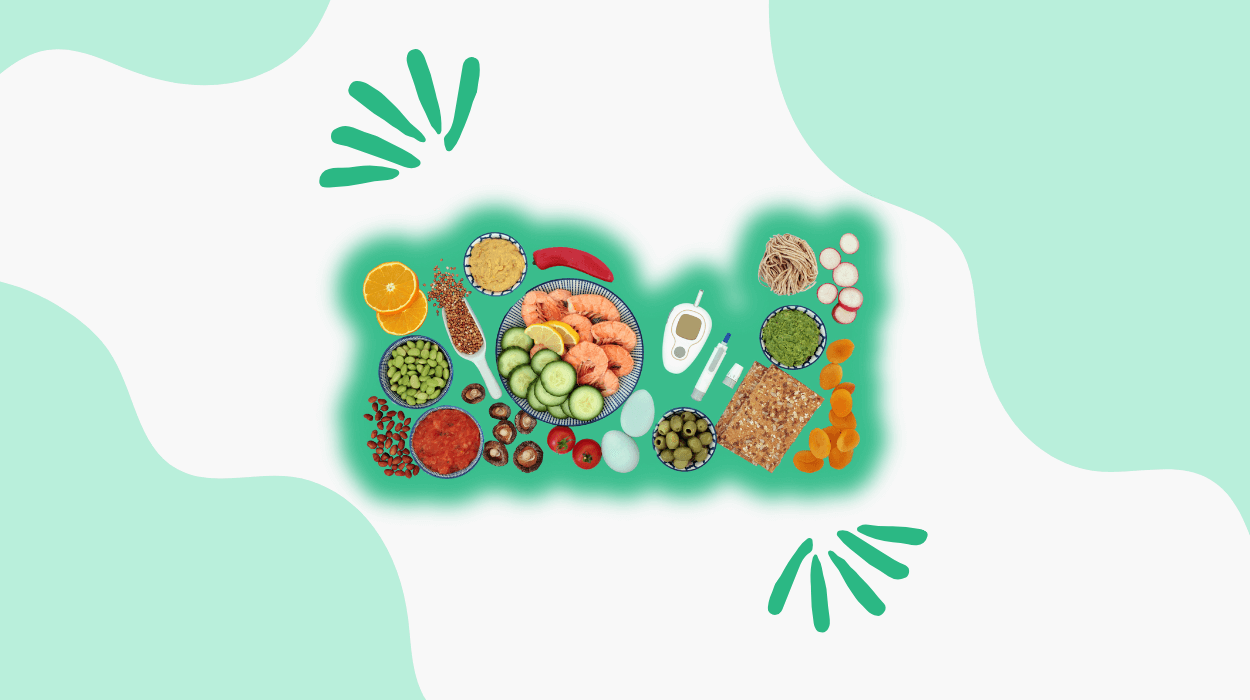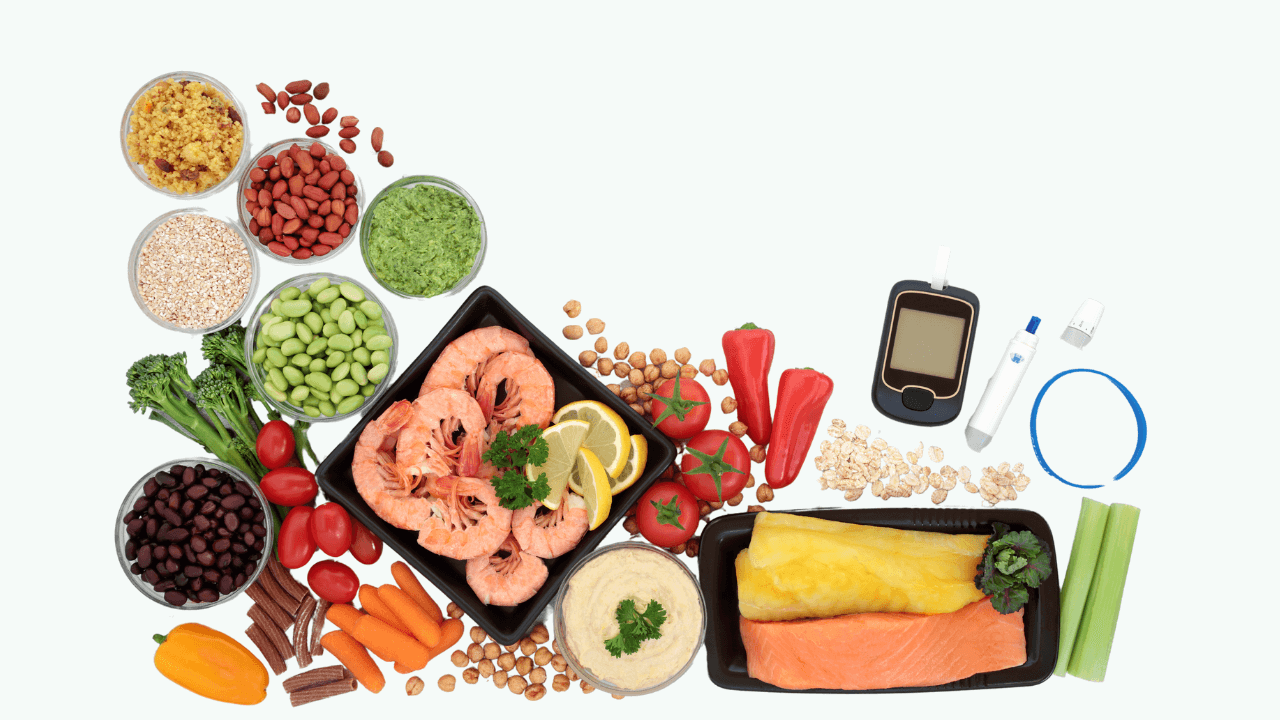

Healthy dietary choices improve blood sugar control and reduce the risk of diabetes-related complications.
Replacing unhealthy foods with nutritious substitutes could enhance the effectiveness of insulin and maintain stable blood sugar levels in people with diabetes.
Bodyweight and genetics also affect your blood sugar levels. Excessive stress could also cause random fluctuations in your blood sugar levels.
However, staying healthy by following a nutritious diet could help regulate your blood glucose levels. Here are 12 best foods that could support blood sugar management effectively.

Fatty fish may help regulate blood sugar and provide essential nutrients that may manage blood sugar levels. As per a study, people who consumed fatty fish every week showed noticeable improvement in their sugar levels compared to those who took lean fish in their meals. Oily fish, such as cod, salmon, and haddock, are replete with omega-3 fatty acids and may prevent blood vessel inflammation caused by high glucose concentrations.
Strawberries contain a high antioxidant content with compounds like polyphenols and anthocyanins that may reduce oxidative stress and enhance insulin sensitivity in people with type-2 diabetes, which could delay the progression of diabetes.
A 100g serving of strawberries contains only 32 calories, 7.68g of carbs, and just 4.89g of total sugars. It also possesses nutrients like magnesium, potassium, vitamin C, and folate.
Regular consumption of 40-250g of strawberries could improve blood sugar control by reducing postmeal insulin levels, regulating sugar metabolism, and improving insulin sensitivity. Such effects may increase glucose uptake by body cells, which provides better blood sugar control.
When chewed or chopped, broccoli undergoes an enzymatic reaction that releases the sulforaphane compound. This compound has blood sugar-lowering virtues, which may enhance insulin sensitivity and reduce insulin crashes.
A 100g serving of broccoli has 34 calories, just 1.7g of sugars, and 2.6g of dietary fiber. It also has essential minerals and vitamins like folate, vitamins C and K, and potassium. The fiber content of broccoli may delay carbohydrate absorption and help regulate blood sugar.
One medium-sized (44g) egg contains approximately 63 calories, 6 grams of protein, and a negligible 0.163g of total sugars. They are a concentrated source of protein, carbs, healthy fats, and vitamins associated with better blood sugar control.
Regularly consuming one large egg daily may reduce fasting blood glucose by 4.4% and improve insulin sensitivity in diabetic adults or prediabetics.
Consuming 6-12 eggs a week could lower stroke risk, increase insulin resistance, and promote optimal cholesterol balance. Such effects may subside the additional complications associated with diabetes and help stabilize blood sugar levels.
Whole grains contain high fiber and complex carbohydrates. They have a lower glycemic index, which increases the breakdown time and delays the rise of insulin post-meal.
Such effects may promote optimal blood glucose control and may prevent unhealthy snacking between meals. Regular oat intake may reduce HbA1c and fasting blood sugar levels.
Nuts have a low GI score and are related to reduced type 2 diabetes risk. They provide plant-based protein, phenolic compounds, and unsaturated fatty acids, which may impart anti-diabetic effects. In nuts, alpha-lipoic acid (ALA) and omega-3 fatty acids may positively impact diabetes management. These polyunsaturated fats may also reduce the risk of cardiovascular issues. Consuming almonds and peanuts regularly in a low-carb diet could improve postmeal and fasting blood glucose levels. Walnuts may lower blood glucose levels and HbA1C markers that support long-term blood sugar control. Nuts have a high fiber content, which delays carbohydrate metabolism and prevents rapid spikes in blood sugar levels. They are also rich in magnesium, which might improve insulin sensitivity and glucose metabolism.
Shirataki noodles contain a starch called glucomannan, a viscous fiber extracted from the Konjac root, which keeps you full for longer and retains water. A 100g serving of shirataki noodles contains only 9 calories, 2.68g of carbohydrates, and 2.7g of dietary fats. Glucomannan in these noodles could improve fasting blood glucose, post-meal blood glucose, and fasting insulin levels.
Flaxseeds contain lignans, a plant-based compound with antioxidant and anti-inflammatory properties that may positively impact blood sugar control and insulin sensitivity.
A 100g serving size of flaxseeds could provide 18.3g of protein, 42.2g of healthy fats, and only 1.55g of total sugars. They also contain nutrients such as calcium, phosphorus, zinc, vitamin B6, and folate.
Flaxseeds have a high fiber content and healthy fats that may manage blood sugar. They contain a soluble fiber called mucilage gum, which disrupts sugar absorption in the bloodstream and helps promote blood sugar control.
Avocados have a low-calorie content and high fiber and fat content. One cup (150g serving) of avocado contains 240 calories, 10g of dietary fiber, and approximately 13g of carbs.
The high fiber content of avocados could delay digestion and carbohydrate metabolism. Such a mechanism could prevent insulin spikes, improve satiety, and aid healthy weight management.
Avocados contain a compound called Avocatin B, which may enhance insulin sensitivity. It inhibits incomplete oxidation in skeletal muscles and the pancreas, improving glucose control.
While avocados are high in fat, they contain the heart-healthy monounsaturated fats. These fats may improve insulin sensitivity and reduce insulin resistance. Such effects could increase glucose uptake by cells and provide better glycemic control.
Extra-virgin olive oil is replete with monounsaturated fatty acids (MUFA). MUFAs could reduce insulin resistance and increase sensitivity, helping the body’s cells respond more effectively to insulin.
It may reduce postprandial (postmeal) triglyceride levels and improve glycemic management in prediabetic patients. The fats in olive oil may lower blood sugar spikes and increase satiety, contributing to better glucose control.
Greek yogurt has a lower glycemic index, which may cause a gradual rise in blood sugar levels. It may help maintain stable blood glucose levels and prevent sudden spikes. A 100g serving of Greek yogurt has 73 calories, approximately 10 grams of protein, and around 4 grams of carbohydrates. It also possesses nutrients like calcium, potassium, selenium, vitamin B6, and choline. Regular consumption of Greek yogurt may improve body composition and body mass index (BMI).
Beans contain a low glycemic index and are rich in protein, fiber, and magnesium. A 100g serving of kidney beans contains 127 calories, 8.67g of protein, 6.4g of dietary fiber, and just 0.32g of total sugars.
Beans could help regulate blood sugar levels and reduce postprandial blood sugar levels, improving glycemic response and providing optimal blood sugar control.
Unregulated blood sugar levels give rise to diabetes and other metabolic disorders. However, consuming diabetic-friendly foods may help check blood glucose levels, insulin, and inflammation and subside the risk of associated complications.
Try swapping your high-glycemic foods with foods with a low GI index. Doing so may reduce blood glucose spikes and help provide sustained energy throughout the day.
Reducing added sugars, keeping tabs on your blood sugar levels, exercising regularly, and exercising portion control help stabilize blood sugar levels.
Tyler Read earned an undergraduate academic degree from Sonoma State University, California and is a certified personal trainer (CPT) with NASM (National Academy of Sports Medicine). With over 16 years of experience, Tyler has trained clients both online and in-person.
He is passionate about helping others turn their love for fitness into a career. Tyler has worked with many local and commercial gyms before establishing his successful private personal training business, which he continues to operate.
